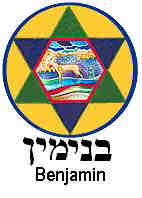Benjamin [61480]

 General Notes: General Notes:
http://en.wikipedia.org/wiki/Benjamin
Benjamin (Hebrew : , Modern Binyamin Tiberian Biny) in the Book of Genesis , is a son of Jacob , the second (and last) son of Rachel , and the founder of the Israelite Tribe of Benjamin ; in the Biblical account, unlike Rachel's first son \endash Joseph , the father of Ephraim and Manasseh \endash Benjamin was born after Jacob and Rachel arrived in Canaan . He died in Egypt on the 11th of Cheshvan (which was also his birthday) 1443 BCE at the age of 111.
However, some view these details as postdiction , an eponymous metaphor providing an etiology of the connectedness of the tribe to others in the Israelite confederation.
Benjamin's sons
The genealogical passage names each of the sons; classical rabbinical tradition adds that each son's name honors Joseph:
Belah (meaning swallow), in reference to Joseph disappearing (being swallowed up)
Becher (meaning first born), in reference to Joseph being the first child of Rachel
Ashbel (meaning capture), in reference to Joseph having suffered captivity
Gera (meaning grain), in reference to Joseph living in a foreign land (Egypt)
Naaman (meaning grace), in reference to Joseph having graceful speech
Ehi (meaning my brother), in reference to Joseph being Benjamin's only full-brother (as opposed to half-brothers)
Rosh (meaning elder), in reference to Joseph being older than Benjamin
Muppim (meaning double mouth), in reference to Joseph passing on what he had been taught by Jacob
Huppim (meaning marriage canopies ), in reference to Joseph being married in Egypt, while Benjamin was not there
Ard (meaning wanderer/fugitive), in reference to Joseph being like a rose
The Torah's Joseph narrative, at a stage when Joseph is unrecognised by his brothers, describes Joseph as testing whether his brothers have reformed, by secretly planting a silver cup in Benjamin's bag, then publicly searching the bags for it, and after finding it in Benjamin's possession, demanding that Benjamin become his slave as a punishment; the narrative goes on to state that when Judah (on behalf of the other brothers) begged Joseph not to enslave Benjamin and instead enslave him, since enslavement of Benjamin would break Jacob's heart, this caused Joseph to recant and reveal his identity. The midrashic book of Jasher argues that prior to revealing his identity, Joseph asked Benjamin to find his missing brother (ie. Joseph) via astrology , using an astrolabe -like tool; it continues by stating that Benjamin divined that the man on the throne was Joseph, so Joseph identified himself to Benjamin (but not the other brothers), and revealed his scheme (as in the Torah) to test how fraternal the other brothers were. However, some classical rabbinical sources argue that Joseph identified himself for other reasons.[5] In these sources, Benjamin swore an oath, on the memory of Joseph, that he was innocent of theft, and, when challenged about how believable the oath would be, explained that remembering Joseph was so important to him that he had named his sons in Joseph's honour; these sources go on to state that Benjamin's oath touched Joseph so deeply that Joseph was no longer able to pretend to be a stranger.
In the narrative, just prior to this test, when Joseph had first met all of his brothers (but not identified himself to them), he had held a feast for them; the narrative heavily implies that Benjamin was Joseph's favorite brother, since he is overcome with tears when he first meets Benjamin in particular, and he gives Benjamin five times as much food as he apportions to the others. According to textual scholars, this is really the Jahwist's account of the reunion after Joseph identifies himself, and the account of the threat to enslave Benjamin is just the Elohist's version of the same event, with the Elohist being more terse about Joseph's emotions towards Benjamin, merely mentioning that Benjamin was given five times as many gifts as the others A version of the Joseph narrative appears in the Qu'ran , which also mentions Benjamin, describing him as having been regarded particularly highly by Joseph, and by Jacob; Baidawi , the quintessential mediaeval commentator on the Qu'ran, records that there was a tradition that the brothers had been made to sit in pairs at the feast, so that Benjamin had to sit on his own, which resulted in Benjamin weeping over the loss of Joseph. Not only is Benjamin treated as the favourite brother of Joseph, and a favourite of Jacob, but classical rabbinical sources also stress the fact that Benjamin is referred to as the beloved of Yahweh in Deuteronomy ; these rabbinical sources concluded that Benjamin died without ever committing sin - one of only four men to have done so (the other three being Amram , Jesse </wiki/Jesse>, and Kileab ).
|







